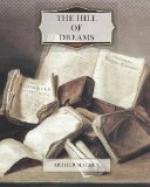“Never mind, Gathy,” old Gervase had observed. “If the impudent young puppy comes here again, we’ll see what Thomas can do with the horse-whip.”
“Poor dear child,” Mrs. Gervase added in telling the tale, “and she was so fond of him too. But of course it couldn’t go on after his shameful behavior.”
But Lucian was troubled; he sought vainly for the ideal womanly, the tender note of “come rest on this bosom.” Ministering angels, he felt convinced, do not rub red pepper and sulfuric acid into the wounds of suffering mortals.
Then there was the case of Mr. Vaughan, a squire in the neighborhood, at whose board all the aristocracy of Caermaen had feasted for years. Mr. Vaughan had a first-rate cook, and his cellar was rare, and he was never so happy as when he shared his good things with his friends. His mother kept his house, and they delighted all the girls with frequent dances, while the men sighed over the amazing champagne. Investments proved disastrous, and Mr. Vaughan had to sell the grey manor-house by the river. He and his mother took a little modern stucco villa in Caermaen, wishing to be near their dear friends. But the men were “very sorry; rough on you, Vaughan. Always thought those Patagonians were risky, but you wouldn’t hear of it. Hope we shall see you before very long; you and Mrs. Vaughan must come to tea some day after Christmas.”
“Of course we are all very sorry for them,” said Henrietta Dixon. “No, we haven’t called on Mrs. Vaughan yet. They have no regular servant, you know; only a woman in the morning. I hear old mother Vaughan, as Edward will call her, does nearly everything. And their house is absurdly small; it’s little more than a cottage. One really can’t call it a gentleman’s house.”




